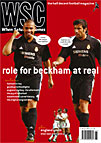 Charles Morris tells how Anthony Hughes left League football behind aged 22
Charles Morris tells how Anthony Hughes left League football behind aged 22
In the summer of 1993 it looked as though 19-year-old Anthony Hughes had the footballing world at his feet. The Crewe Alexandra player had represented England at the Under-20 World Youth Championship in a team which included Paul Scholes, Nicky Butt and Nick Barmby, the latter having become a close friend of Hughes. Earlier in his blossoming career, the tall central defender had been selected as a student at the Football Association’s School of Excellence at Lilleshall. And his club, for whom he had made his debut on the opening day of the 1992-93 season, had a reputation for launching youngsters on glittering careers.
The club had already nurtured the talents of England internationals David Platt, Geoff Thomas and Rob Jones, and Hughes’s fellow squad members at Gresty Road included Neil Lennon, Danny Murphy, Craig Hignett and Ashley Ward. The Premiership was just a season old, the 1990s football boom was under way and top players’ salaries were rocketing to undreamed of heights. Yet just a year later Hughes was given a free transfer to non-league Morecambe, the beginning of a spiral downwards that would see him quit football of any reasonable level within a few years.
“He was a star in the making, but one that got away,” says Terry McPhillips, the assistant academy director at Crewe who helped develop the Liverpool-born player’s talent. McPhillips says Hughes’s problems began with an unusually late spurt of growth that resulted in him gaining too much weight. A back injury also bedevilled his first-team career at Crewe, whom he had joined as a trainee from school in Liverpool, and his weight problems may have contributed to this injury. In total, he made just 23 appearances for Crewe in the “new” Third Division, with five of those as a substitute, and scored his solitary league goal in a 4-0 home win against Carlisle United in April 1993.
With no end to Hughes’s physical problems in sight, Crewe manager Dario Gradi decided to release him in 1994. He was snapped up by Morecambe – but if physical difficulties had been his downfall at Crewe, it was problems of a mental nature that prevented any chance of resurrecting his career at the Lancashire club.
For Jim Harvey, Morecambe’s manager, Hughes turned out to be a likeable but frustrating acquisition. Signing a former England Under-20 player, and a pal of Nick Barmby’s to boot, was clearly a coup for an ambitious non-league club. But, possibly because of the huge disappointment of not making the grade at Crewe, Hughes’s heart and mind did not always seem to be on playing for Morecambe. “He was a very good footballer, he had all the talent, but he did not apply himself,” says Harvey. “I think his background did not help him. He did not have a problem with overdoing the social life or anything like that, it was just a mental thing with Anthony. He was a lovely lad and had tremendous talent, but could not get things together.”
After four years, albeit as a regular member of Morecambe’s team, his contract was over and was not renewed.
According to McPhillips, Hughes then played for Cheshire side Winsford United in the Unibond League, before quitting football. Now 29, an age when most players are in their prime, he is coaching youngsters in Liverpool. Recently McPhillips invited his former star pupil to view some of Crewe Alexandra’s coaching sessions with youngsters. The aim was to improve Hughes’s knowledge as a coach – but it must also have caused him to reflect that football can be a fickle pursuit, in which talent alone is not enough.
From WSC 196 June 2003. What was happening this month